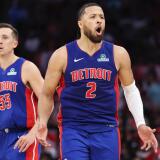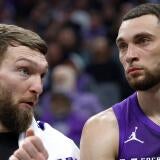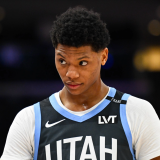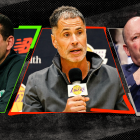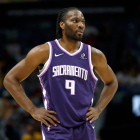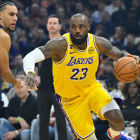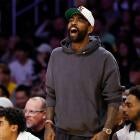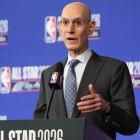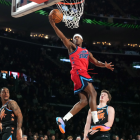Brandon Ingram landing spots: Pelicans All-Star forward looks like one of the offseason's top trade candidates
Ingram is eligible for a four-year extension worth a projected $208 million
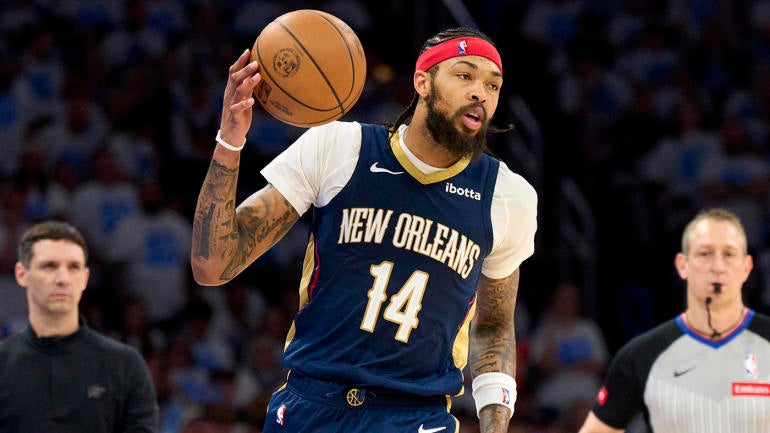
On Wednesday, The Athletic's Shams Charania reported that New Orleans Pelicans All-Star Brandon Ingram "had a minor exchange" in the locker room with coach Willie Green over his role in the offense. According to Charania, Ingram "wanted the ball and wanted the coach to help facilitate that." On the surface, this could easily be brushed aside as a typical conflict between a player and his coach, but there's been plenty more Ingram buzz about where that came from.
When the Pelicans lost their first Play-In game to the Los Angeles Lakers, Adam Mares said on his All NBA Podcast that he had heard that Ingram was "pretty upset" with Green after the Pelicans coach decided not to put him on the floor for the closing minutes of the game even after Zion Williamson got hurt. While Green acknowledged that Ingram was recovering from an injury and still working his way back into a rhythm, he ultimately explained the choice by saying he "just liked the group that was on the floor at the time."
Ingram was held to just 14.3 points per game as the Pelicans were swept by the Oklahoma City Thunder in the first round. His regular season was somewhat disappointing as well. He saw declines in points, rebounds, assists and 3-point percentage this season. The Pelicans had a slightly better net rating this season with Ingram on the bench (plus-4.9) than they did with him in the game (plus-4). All in all, this isn't exactly an ideal time for Ingram to be going into a contract year.
And yet, Ingram is about to enter the last year of his deal. He is eligible for a four-year extension worth a projected $208 million, but there is simply no way the Pelicans could justify giving it to him. Even if the relationship were smooth and Ingram was coming off of a better season, their own balance sheet all but assures a split.
Williamson and C.J. McCollum are already on expensive long-term contracts. Trey Murphy, Ingram's expected replacement in the starting lineup, is eligible for a rookie extension this offseason. Jose Alvarado can become a restricted free agent this summer, and based on how the Pelicans dealt with Herb Jones last offseason in a nearly identical situation, they will likely extend him now rather than risk him leaving as an unrestricted free agent in 2025. Starting center Jonas Valanciunas is not under contract. You simply cannot pay everyone. If New Orleans is going to pay Williamson, McCollum, Murphy, Jones and Alvarado, there just isn't room for another $50 million salary on this roster.
The Pelicans could theoretically move another big salary instead, but why would they? Williamson may carry injury risks, but his upside is their only viable path to a championship. The benefit of his absences is that the Pelicans know firsthand what a team with Ingram as its focal point looks like. The ceiling is roughly .500. McCollum might make more sense as a trade candidate given the team's need at point guard, but moving him does little to solve the log jam at forward. Williamson has to start because he's the best player on the team. Jones has to start because he's the best defender on the team. Murphy has to start because he's the best shooter on the team. There's no way to start all four of those players and Ingram while covering playmaking and rim-protection bases.
So Ingram is the likeliest player to move here, but he's still a somewhat unusual trade candidate. Rarely will a win-now team trade an All-Star with the intention of continuing to win in the present, but that's the goal for the Pelicans. They're already deep enough in terms of picks from the Anthony Davis and Jrue Holiday trades to focus entirely on acquiring players in this deal. In a perfect world, they'll be able to turn Ingram into either a long-term point guard or a long-term center making something like half of Ingram's max. The Pelicans, who have never paid the luxury tax, would love to set themselves up to avoid the tax fully over the next several years. If that isn't possible, they at least need to avoid the financial catastrophe they're heading towards.
So which teams make sense? A few come to mind.
Cleveland Cavaliers
Cleveland obviously has an All-Star of its own to deal with this offseason, as Donovan Mitchell will also be one year away from free agency, and the widespread assumption is that he will decline an extension from the Cavaliers. That would likely trigger trade talks, but Mitchell to New Orleans doesn't make immediate sense. He has been linked primarily to higher-profile markets, so the Pelicans probably aren't a fit.
But Cleveland does have another dilemma to solve this offseason: the long-term viability of the Evan Mobley-Jarrett Allen partnership. If those two struggled offensively with Mitchell in the lineup, odds are, they are going to become an even bigger offensive issue when he's gone. This works out nicely for the Pelicans, as Allen could be their long-term Valanciunas replacement. He has two years left on his contract after this one at a flat $20 million per year, which would save the Pelicans a nice chunk of change in an Ingram deal.
Cleveland needs a shotmaker if Mitchell is going to get traded, but it also needs roster balance. An Ingram acquisition could position Cleveland to pay one high-end guard (Darius Garland), one wing (Ingram) and one big man (Mobley). The Cavaliers would then presumably use the assets acquired in whatever Mitchell deal they make to round out the roster with perimeter defense and perhaps some more front-court versatility. It's one of the more sensible fake trades of the offseason, so if Ingram does indeed become available, expect to hear it floated a fair bit in the coming months.
Atlanta Hawks
Speaking of teams that are about to trade a guard, the Hawks have two point guards that absolutely need to be split up. Would Trae Young make sense as a fit in New Orleans? He'd be an excellent pick-and-roll partner for Zion Williamson, but his defensive vulnerability would be a problem, and the Pelicans have been at their best with the ball in Williamson's hands. Besides, making the money work is a bit tougher here without expanding the deal and perhaps including a third team, as Young is on a max deal of his own.
Dejounte Murray is a bit easier to fit onto the Pelicans. He signed a four-year extension last offseason that hasn't even kicked in yet and will pay him an average of around $28.5 million per year through the 2027-28 season. The Pelicans can work with that. Murray struggled defensively in Atlanta, but he was a strong defender as a Spur when he was playing point guard. If the Pelicans can help him return to form, their defense stands to improve a fair bit. His mid-range shot-making might make it easier to move McCollum's salary in another deal, ideally for a center.
The Hawks have tax concerns of their own here. They're likely have to move either De'Andre Hunter or Bogdan Bogdanovic to a third team in order to justify an Ingram extension themselves. That's doable. Atlanta needs a shakeup of some sort, and if a full rebuild isn't on the menu, a wing is probably their immediate target.
Houston Rockets
The Rockets went big-game hunting at the deadline when they tried to swipe Mikal Bridges away from Brooklyn. The Nets didn't bite, but Ingram would fit in with the Rockets similarly. While the Rockets have a number of younger players that have high offensive upside like Alperen Sengun and Jalen Green, they lack a traditional tough shot-maker for the end of games. If they were interested in Bridges, they may be interested in Ingram at a lower price.
The real questions here related to Houston's existing infrastructure. Would Ime Udoka really move Dillon Brooks to the bench after he revitalized Houston's defense last season? Would Brooks need to be in the deal? The Rockets can match money with ancillary pieces like Steven Adams, Jeff Green and Jock Landale, but would the Pelicans want a package built around Brooklyn's draft picks? Perhaps if they could line up another deal to turn those picks into win-now pieces. Houston would have a theoretical interest. There's just not an easy way to make a trade.
Looming over all of this is the upside of Houston's youngsters. Sengun took a major leap early in the season and Green took a major leap late in it. Cam Whitmore showed a lot of flashes as a rookie, and while he's not nearly as developed as Ingram, he's going to be a high-scoring wing in the near future. Are the Rockets willing to make their move for a B-list star when they have young players who could potentially fill the same role? Or are they waiting either for a true A-lister or at least a more versatile option like Bridges?
Detroit Pistons
The other teams on this list can afford to be picky. The Pistons have won 80 games in the past four seasons. While we don't know who their president of basketball operations will be or what his priorities will look like, it seems likely that after all of that time at the bottom of the league, ownership will push to be competitive quickly. Getting win-now players to Detroit won't be easy. Top free agents are all but unavailable to Detroit. The Pistons will have to take a risk like the one they did on Blake Griffin in 2018.
While Ingram doesn't come with the same health concerns, the principle is similar: get a player who, for some reason or another, is not quite as valuable as he once was and then pay him a lot of money (though in Griffin's case, he had no choice). Head coach Monty Williams' propensity for mid-range shots would likely endear him to Ingram, and while the Pistons have a defensive wing in Ausar Thompson, they don't really have any core offensive players that profile as traditional forwards.
The Pelicans would likely ask for Jaden Ivey, and if they could get him, having two years of his rookie deal would generate massive savings. Are the Pistons willing to trade Ivey this soon? They shouldn't, but Williams didn't seem all that committed to him last season, and if Cade Cunningham is their point guard, the shooting issues Ivey has thus far had from deep make him a questionable long-term fit. Those same problems exist in New Orleans, but the Pelicans have one of the best shooting coaches in the business in Fred Vinson. He's worked miracles before, and if he got his hands on Ivey, the Pelicans would have a better chance than the Pistons of actually maximizing his skill set.


